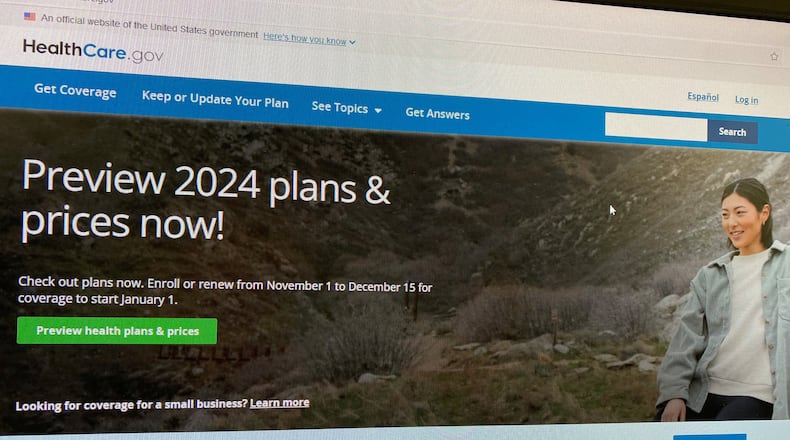Georgians looking for health insurance on the Affordable Care Act marketplace exchange can start window shopping now. Open enrollment begins Nov. 1 and runs through January 15.
This is an important year for consumers in Georgia and other states. Hundreds of thousands of people in the state are being kicked off Medicaid along with the nationwide end of pandemic protections. State officials are hoping some of those people who lost Medicaid will have gotten new jobs and higher incomes, and so can shift to getting insurance on the ACA marketplace.
Only people who make the federal poverty level or above qualify for the subsidized ACA premiums.
For those who do make that much, subsidized premiums are more affordable than a few years ago. Under a Biden administration initiative, no household should pay more than 8.5% of its income on premiums. That was a part of pandemic relief legislation that will expire in 2025. The Kemp administration also has a subsidy program that is helping lower premiums.
Those lower premiums have led to more insurance customers, and more insurance companies chasing them. The Georgia marketplace this year once again has a healthy assortment of companies offering plans, and the rocky start a decade ago is long gone.
Ground zero for shopping remains the federal website, healthcare.gov. The Kemp administration’s fight to block Georgians’ access to that site in favor of a new state-run site is on hold.
Here is that and some other resources for Georgians looking to see if they can enroll, and compare plans and premiums available to them.
RESOURCES
Healthcare.gov
1-800-318-2596
TTY: 1-855-889-4325
This is the main federal shopping website for ACA plans. It allows you to input your expected income level, family size and ZIP code, and then gives you plans and prices you’re eligible for. It presents them together in order to contrast and compare. It allows shoppers to check if their doctor or hospital is currently in the plan’s coverage network. The website has translations in 15 languages in addition to English.
Healthsherpa.com
1-855-772-2663
This is a privately run website that does most of the things Healthcare.gov does. Some agents and shoppers say it’s easier to use.
InsureGA.org
1-866-988-8246
Insure Georgia is registered as a nonprofit insurance agency, and assists people signing up for ACA plans. It’s based in Macon and helps people across the state.
NAVIGATORS
Navigators can help people sign up for ACA plans and also explain who’s eligible for Medicaid or Medicare. The funding numbers reflect the federal dollars spent to ensure each navigator is staffed and ready to answer consumer’s calls.
The Georgia Association for Primary Health Care (GAPHC)
1-844-442-7421 (press 1) (Staffed Monday through Friday 8:00 AM to 5:00 PM.)
Federal navigator funding: $725,410
This is a statewide network of clinics. It mainly gives assistance in person at the clinics and at outreach tables at public events, but help also can be reached at the phone number above. This group is also subcontracting out to the Hispanic Health Coalition of Georgia (HHCGA), the North Georgia Healthcare Center, the Center for Pan Asian Community Services, the Spring Creek Health Cooperative, and Georgians for a Healthy Future. Its grant award states, “GAPHC will provide assistance to any consumer seeking assistance.”
Georgia Legal Services Program (Georgia ENROLL)
1-866-442-3676 (Staffed Monday through Friday 8:00 AM to 6:00 PM. Callers can leave a message to make an appointment, and sometimes weekend ones might be available.)
Federal navigator funding: $137,075
Works in the 145 rural Georgia counties. Does not work in Atlanta-area counties Clayton, Cobb, Dekalb, Fulton or Gwinnett. The organization has experience helping people navigate legal difficulties with Medicaid, and is targeting vulnerable populations for assistance.
Mercy Care
678-843-8527
Federal navigator funding: $42,500
Mercy Care is a charity clinic that works with people in DeKalb and Fulton counties, and portions of Gwinnett and Cobb Counties. It focuses on assisting people experiencing homelessness, marginally housed, and low-income individuals.
About the Author
Keep Reading
The Latest
Featured


